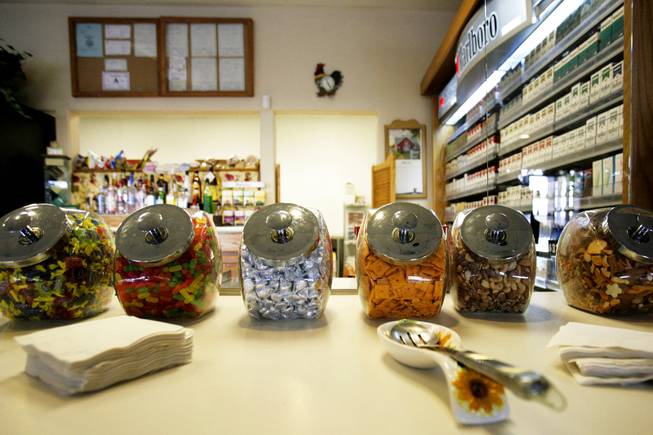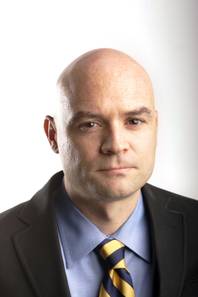
A row of snacks is offered to players at Dotty’s near Eastern and Serene in Henderson on Thursday, March 24, 2011.
Wednesday, May 8, 2013 | 2 a.m.

J. Patrick Coolican
For the first time in years, the Nevada Legislature is seriously discussing gaming policy.
As R&R Partners gaming lobbyist Pete Ernaut said, “Protection of this industry: There can’t be a higher priority of this body than getting the No. 1 industry in this state right.”
Indeed, I couldn’t agree more that we need to strengthen our economic engine, after a period of intense consolidation and debt and bankruptcies and some serious questions about the goings-on in Macau.
Turns out that’s not what Ernaut was talking about. He was referring to the ongoing battle between restricted gaming licensees, which are the bars and slot parlors and other locations with no more than 15 slot machines, and on the other side, Ernaut’s clients — the big resorts with their nonrestricted licenses.
The Nevada Resort Association — especially Station Casinos — is livid about Dotty’s, the quiet little slot arcades that seem to anchor so many forlorn strip malls.
Big Gaming argues, persuasively I think, that both legislators and regulators never intended to allow a slot arcade on every corner of our community, which is why the legal language always required that gaming be “incidental” to the main business in these establishments, be it a bar or convenience store. Bar first, gaming second.
Gaming is clearly not incidental at Dotty’s, where the only sounds are soft rock and creepy clacking of fingers on slot buttons.
(To be sure, Dotty’s was always properly licensed by regulators — you can’t really blame them for the policy drift here. And, they certainly deserve credit for their ingenious marketing.)
The Clark County Commission, at the urging of the Nevada Resort Association, put a vice grip on the smaller players two years ago with a bunch of new requirements for new locations, including a bar and a kitchen, which the Dotty’s storefronts traditionally lacked.
As I wrote at the time, it was like a David and Goliath story, but only if David were a little hustler who took money from old ladies.
There’s been so much uncertainty surrounding this issue that the Legislature should codify the policy in law -- or perhaps I should say: Codify it in law again.
Sean Higgins, a bar owner and lobbyist for most of the 1,900 restricted licensees, says the resort association “plays Big Brother to other industries, dictating to us what is appropriate operation for us. Enough is enough.”
Higgins says the whole point of the legislation is to stifle competition.
I’m sympathetic, and I have no illusions about Big Gaming’s motives here, which involve money, currency, and also money.
To his point, however: Are we stifling competition? Yes, we are, and that’s OK. We aren’t talking about clothing or convenience stores here. The statute governing gaming begins with a preamble that lays out a far-reaching public policy explicitly stating that gaming’s pre-eminent place in Nevada’s social and economic life means we will take extraordinary steps to regulate it, for the health and welfare of the industry and the broader community.
Dotty’s is little more than a dopamine delivery device, and it contributes very little to the broader community — just a handful of jobs, no amenities and a paltry sum of taxes compared with the big resorts despite its more than 80 locations, more than 50 of which are restricted locations.
(I distinguish between Dotty’s and actual bars, where people meet and socialize and tell embellished stories and bad jokes and complain about the president and eat and drink — these are sacred places. Dotty’s is not.)
Indeed, in part because restricted licensees pay a small flat fee per slot machine instead of the gross gaming tax like the big resorts pay, the small guys paid just $13 million in taxes compared with $653 million by the resorts last year. And that’s just gaming taxes. Throw in room taxes, sales taxes, the live entertainment tax and all the rest, and the resorts paid $1.3 billion in total taxes, or 42 percent of general fund.
This doesn’t mean, however, that regulators or the Legislature should always favor the resorts over smaller competitors, especially when it comes to innovative new technology.
Gaming lobbyists also want to snuff out new sports betting kiosks, which resemble ATMs for sports betting, that you find in many taverns around the valley.
We can get deep in the weeds about how these machines were originally approved, about whether they are a “gaming device” or an “associated equipment,” but there’s no reason to bore ourselves.
This issue is entirely different from Dotty’s, which is like an invasive species around the valley.
The sports book kiosks, by contrast, are going into existing businesses that already have slot machines. It’s a nice convenience for people at a bar who are enjoying their team and their chicken wings and don’t want to have to trudge over to Sunset Station or another sports book to place a bet.
And really that’s the point: Station Casinos wants to force locals to come to their business — be it bricks and mortar or digital — to make sports bets. It’s bullying, and I see no public policy rationale for it.
As Joe Asher, the CEO of kiosk purveyor William Hill points out, the sports book betting handle and win both increased 20 percent last year, from $140 million to $170 million, despite the existence of the supposedly scary kiosks.
By contrast, the kiosks did only $600,000 in business last year. They aren’t hurting our most important commercial avenue, the Strip. William Hill also does business in the conventional sports books and has no interest in driving down that business, Asher said.
Ernaut, the gaming lobbyist, disagrees. He said in an interview that the kiosks will soon proliferate into every restricted license location, meaning every bar.
This is a violation of the implicit covenant the state has with the resorts, wherein they pay higher taxes and meet more stringent requirements — such as 200 hotel rooms and a bar and a 24/7 restaurant — in exchange for us not allowing every bar in the valley to offer sports betting.
It’s a slippery slope, Ernaut said: Next, the bars will try to get table games.
I think we can draw a bright line at the kiosks. You can have your 15 machines and your sports kiosk, and that’s it. I actually think the convenience would bring more sports betting customers into the fold, which in the end would be good for the wider gaming industry — including the resorts — and good for the state.
I’m open to higher taxes on the kiosks in restricted locations. Call it a “convenience fee.”
Or, hey, I have an alternate idea: If Station Casinos will allow the Culinary Union to organize at its properties with the same card check process the union has used on the Strip, thereby giving workers the rights they deserve, then, fine, I’ll advocate we shut down the kiosks.
No?
OK, kiosks it is, then.

Join the Discussion:
Check this out for a full explanation of our conversion to the LiveFyre commenting system and instructions on how to sign up for an account.
Full comments policy